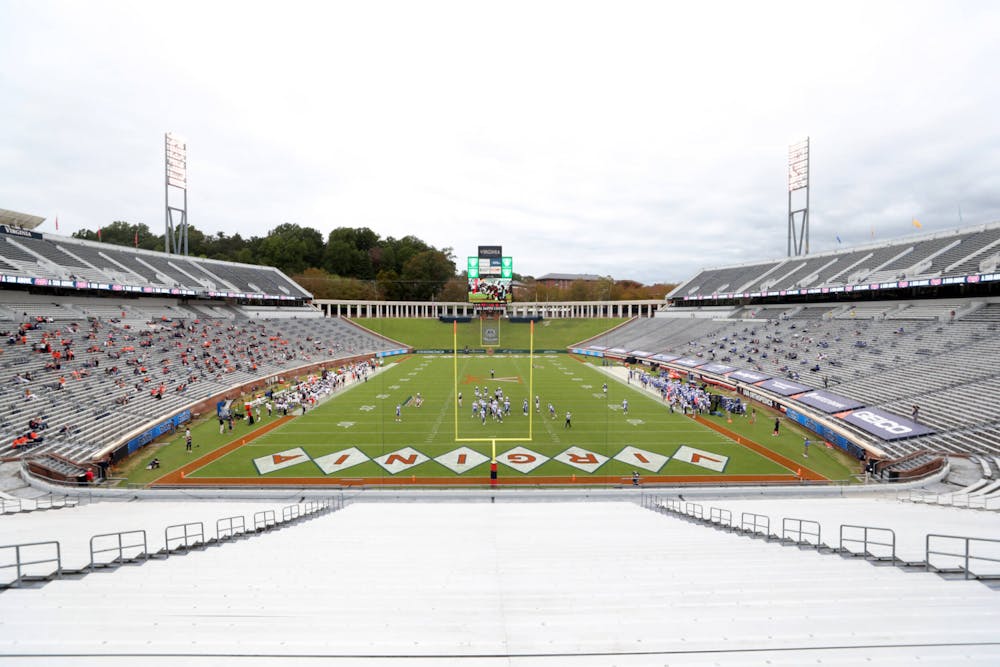An additional 22 student-athletes and staff have tested positive for the novel coronavirus after 1,168 COVID-19 tests were administered over the past week, Virginia Athletics announced Monday. The positivity rate over tests administered Sept. 21 to 27 was 1.88 percent.
This is the second week that Virginia Athletics has reported 22 positive cases of COVID-19, bringing the total number of cases identified from 42 to 64 since student-athletes began their return to Grounds July 5. A total of 4,973 COVID-19 tests have been administered to student-athletes and staff since the beginning of July, indicating a positivity rate of 1.28 percent.
The 22 student-athletes and staff members who tested positive were “notified according to local health guidelines as a means to trace contacts” and “will self-isolate for at least 10 days, or until symptoms are gone plus three days fever free (whichever is longer) and be medically evaluated until they have been cleared to resume daily sports functions,” the press release said.
ACC testing protocol requires that all student-athletes participating in "high-risk" in-season sports be tested three times a week, including one day before a competition then again two days after a game. For Virginia, this includes athletes on the football, volleyball, men’s and women’s soccer and field hockey teams. Testing requirements for off-season sports varies from team to team.
According to Jim Daves, assistant athletics director for media relations, in-season COVID-19 testing updates will not include the number of hospitalizations, if any, or the unique number of student-athletes and staff tested over the past week. They will also not specify which teams student-athletes and staff testing positive were associated with.
In a press conference Monday, football Coach Bronco Mendenhall confirmed that no member of the football team tested positive for COVID-19 and that the team has zero active cases. The football team, after its win Saturday, even gave the honor of “breaking the rock” — a post-game tradition for the Cavaliers — to Kelli Pugh, associate athletics director for sports medicine, for her assistance in navigating the pandemic and ensuring the team was ready for gameday.
“What is remarkable, and I can't articulate it enough, we have not had a positive, a player test positive since they arrived back,” Mendenhall said. “So, the players that tested positive, and there were three, it was attributed to what they came back with. There's been nothing since then, not one, which might be one of the most impressive things that I've ever accomplished.”
Various other programs in the ACC have also seen waves of positive COVID-19 test results recently. Virginia Tech’s football team played Saturday against NC State without 23 players and three coaches, who all missed the game due to coronavirus concerns. Additionally, Notre Dame’s football game versus Wake Forest — scheduled for Sept. 26 — was postponed after seven of 94 COVID-19 tests conducted by the Fighting Irish Sept. 21 came back positive.
As of Friday, there were 275 active cases of COVID-19 among University faculty, staff, students and contract employees — 265 of those were student cases. Currently, 27 percent of the University’s quarantine rooms, which are for students exposed to someone who has tested positive for coronavirus, and 7 percent of its isolation rooms, meant for those who have tested positive themselves, are full. The University has 1,500 quarantine beds.
To address rising case numbers in the University community, University President Jim Ryan announced further restrictions for students living on and off Grounds Tuesday. These guidelines include lowering the number of people allowed in gatherings from 15 to five, reinforcing the need for face coverings when outside of one’s room and banning travel and visitors from outside of Charlottesville for two weeks.
Correction: A previous version of this article incorrectly stated that ACC testing protocol requires that all student-athletes participating in in-season sports be tested three times a week. The article has been updated to reflect that only athletes in sports deemed “high-risk” by the ACC Medical Advisory Group are required to receive testing three times a week.







